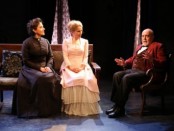Actually, We’re F**ked
In between scenes, the play’s lighting (by Paul Miller) and sound (by M.L. Dogg) conspire to create a hallucinogenic, disorienting slideshow of animals and rotting metropolises — a reminder of the massively dysfunctional world in which the characters of "Actually, We’re F**ked" are potentially raising children. Mind you, the question of whether or not to raise a child in 2019, along with lengthy discussions about genitalia, is essential to this play. And the answer to that question, according to "Actually, We’re F**ked," is much more lovely and hopeful than you might expect. So go see this show if you want a road map for emotionally processing the very f**ked America we live in right now — or very detailed and accurate instructions on how to break into a company server. That is something that appears in this play as well to quite amusing effect. [more]






